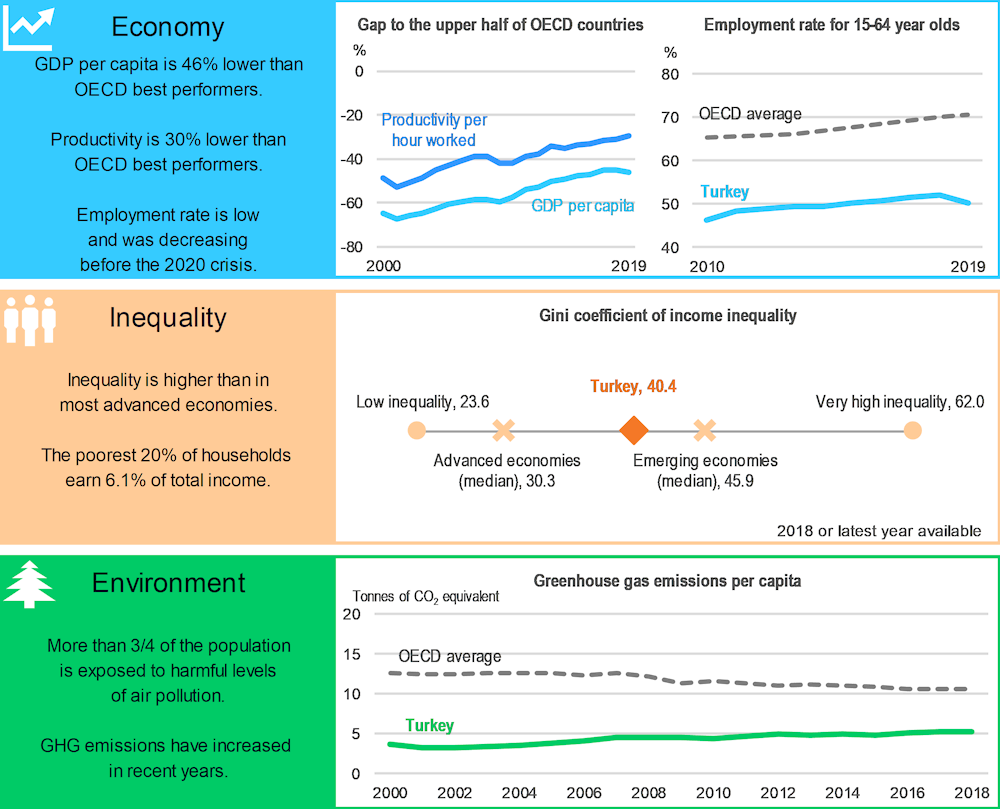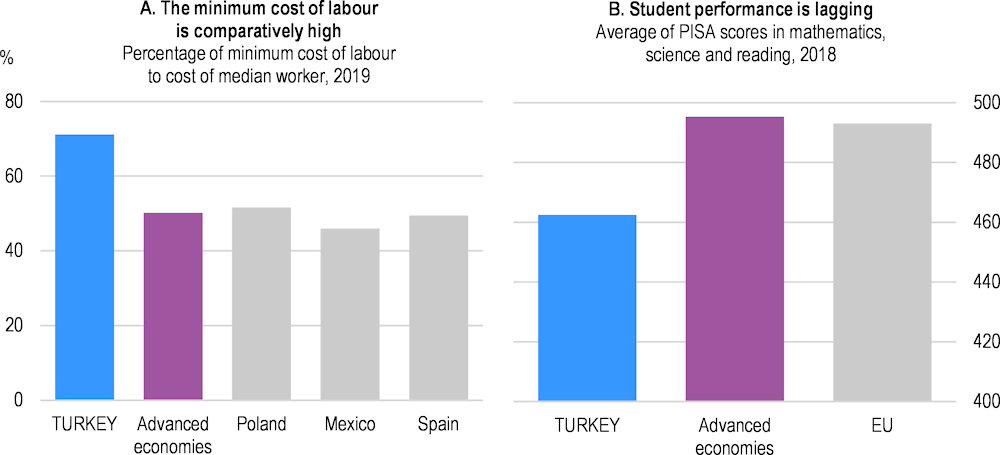For a more inclusive and sustained recovery structural challenges such as low labour force participation of women, widespread informality, weak skills, rigid employment rules hampering reallocation and large share of low-quality employment have to be addressed. The COVID-19 related contraction in economic activity affected informal workers the hardest, as many work in contact-intensive services such as tourism, catering and retail trade.
Economic Policy Reforms 2021

Turkey
Turkey: Performance prior to the COVID-19 crisis

Economy: Percentage gap with respect to the population-weighted average of the highest 18 OECD countries in terms of GDP per capita (in constant 2015 PPPs).
Inequality: The Gini coefficient for disposable income measures the extent to which the distribution of disposable income among households deviates from perfect equal distribution. A value of zero represents perfect equality and a value of 100 extreme inequality. The latest available data for Turkey is 2015.
Environment: Greenhouse gas (GHG) emissions include emissions or removals from land-use, land-use change and forestry (LULUCF). A high exposure to air pollution refers to above 10 μg/m3 of PM2.5.
Source: Economy: OECD, National Accounts, Productivity and Labour Force Statistics Databases; Inequality: OECD, Income Distribution Database and World Bank, World Development Indicators Database; Environment: OECD, Environment Database and United Nations Framework Convention on Climate Change (UNFCCC) Database; OECD (2019), OECD Environmental Performance Reviews: Turkey 2019, OECD Environmental Performance Reviews.
Skills and labour market policies to improve formal employment opportunities
A large proportion of workers are employed informally or semi-formally, as a result of elevated employment costs and rigid employment regulations. These are inflated by high social security contributions and labour taxes, and one of the OECD’s highest minimum wage/median wage ratios (Panel A). The government should reduce the cost of employment, particularly of the low skilled, to support job creation in the formal sector. This could be done, for example, by keeping the real official minimum wage below average productivity gains for a while; allowing regional differentiation of the minimum wage through local consultations between government, employer and employee representatives and enterprise-level collective agreements. In addition, reducing social security contributions for young and low-skilled workers would help to cushion the pandemic-induced unemployment shock on the more vulnerable, and in the medium term can be financed through an increase in the tax base.
Informality is to a significant extent related to weak skills. Recent large refugee inflows have added to the challenge. Turkey has significantly improved enrolment in secondary and tertiary education, but the general quality of education – at all levels - is still disappointing and very heterogeneous (Panel B). To combat informality and face future challenges such as digitalisation, improving educational quality is needed at all levels by granting more autonomy and more resources per student to all education institutions against greater performance accountability. Strengthening vocational education in co-operation with the business sector would improve the employability of young cohorts in higher productivity activities and higher quality jobs – helping to mitigate scarring effects due to the COVID-19 crisis.
A key barrier to formality in Turkey is related to some of the OECD’s most rigid employment rules for both permanent and temporary workers. Informal and semi-formal businesses do not comply with these regulations and as a result ‘gain’ comparative advantage over law-abiding competitors. Employment protection rules for both permanent and temporary workers should be made more flexible, for instance, by reforming the severance compensation regime and making fixed-term contracts more widely available for all workers, but without compromising health insurance and pension entitlements. Such increased flexibility calls however for more effective social protection for those out-of-work and more reliable public funding for retraining and job search.
Turkey: Vulnerabilities and areas for reform

Source: Panel A: OECD calculations based on Taxing Wages and Earnings Databases; Panel B: OECD, PISA Database.
Quality job creation ultimately relies on business dynamism. Anti-competitive regulations, among the most stringent in the OECD, hamper business entry and growth of more productive firms. Improving competition in product markets, by reducing administrative barriers to starting a business, restrictive price regulations in professional and network services and barriers to foreign investment and to cross-border service supply (in trade facilitation, in the treatment of foreign suppliers and in legal and accounting services) can be done with the help of an OECD Competition Assessment Review, to identify and address the most binding constraints.
Population growth, urbanisation, rapid expansion of road transportation and coal power generation are raising considerable environmental pressures, such as carbon emissions and air pollution. Environmental performance should be improved by committing to a gradual transition to carbon pricing in all sectors once the COVID recovery is firmly in place, and by implementing a holistic strategy to enhance air quality, backed by a regular publication of local air quality indicators according to international standards.
Turkey: Summary of Going for Growth priorities and recommendations
|
2019-2020 Reforms |
Recommendations |
|---|---|
|
Labour market: Reduce the cost of employment of the low skilled |
|
|
☑ On the basis of the Law 5510 adopted in 2013, and with provisions adjusted in subsequent years, including in 2019, the government takes over the employer’s share of social security contributions up to level of the official minimum wage In certain eligible regions, and under certain restrictive conditions in the entire territory, effectively lowering their labour cost. |
□ Keep the real official minimum wage below average productivity gains for a while. □ Allow the regional differentiation of minimum wages through local consultations between government, employer and employee representatives and enterprise-level collective agreements. □ Reduce permanently social security contribution rates for all workers and finance these cuts by widening the tax base. |
|
Education and skills: Improve quality and equity of educational achievement at all levels |
|
|
☑ An update of early childhood education curricula is ongoing in 2020 under the project “Increasing the Quality of and Access to Early Childhood Education”. This should also facilitate access with the help of flexible participation models. ☑ The Ministry of Education’s “Vision 2023” strategic plan, adopted in 2019, sets the upgrading of vocational education as its highest priority. |
□ Grant more autonomy and more resources per student to all education institutions while at the same time introducing greater performance accountability. □ Continue to strengthen vocational education in co-operation with the business sector. |
|
Labour market: Reform employment protection legislation and strengthen active labour market policies, addressing the informal sector |
|
|
No action taken. |
□ Reform the severance compensation regime, for example by replacing it with portable individual saving accounts available to all workers. □ Make fixed-term contracts more widely available for all workers. □ Support increased flexibility in labour markets with more effective social protections for those out-of-work and more reliable public funding for retraining and job search. |
|
*Competition and regulation: Ease administrative burdens, price regulations and barriers to foreign investment and cross-border service trade* |
|
|
*New priority |
□ Reduce the administrative burdens for start-ups, the price regulations in professional and network services and the barriers to foreign investment and to cross-border service supply. Identify and address the most binding constraints with the help of an OECD Competition Assessment Review. |
|
Environmental policy: Address environmental pressures caused by population growth, urbanisation, road transportation and expansion of coal power production |
|
|
☑ The Ministry of Environment and Urbanisation started technical evaluations for the introduction of a carbon pricing system (compatible with the EU one). ☑ The government is sponsoring a national electrical car project and reduced, in 2016, the motor vehicles tax for electrical cars by 75%. ☑ The Ministry of Environment and Urbanisation announced in 2019 that it will build 3000 km of bicycle paths and 3000 km of green walking paths by 2023. |
□ Gradually shift to carbon pricing in all sectors once the post-COVID recovery is firmly in place. □ Implement a holistic strategy to enhance air quality, backed by the regular publication of local air quality indicators according to international standards. |
Recent progress on structural reforms
The severe financial turmoil of August 2018, the ensuing economic and employment contraction in 2019 and the COVID-19 shock in 2020 have crowded out the structural reform agenda. The government opted for hands-on investment support measures to stimulate economic activity during this period, side-lining structural and competition reforms. Unions remained very hostile to labour market reforms. The submission of a draft law to the Parliament in October 2020 to make formal fixed-term employment contracts more widely available for workers below 24 and above 50 was a step forward but the proposal was subsequently withdrawn on account of union opposition and opposition in Parliament.